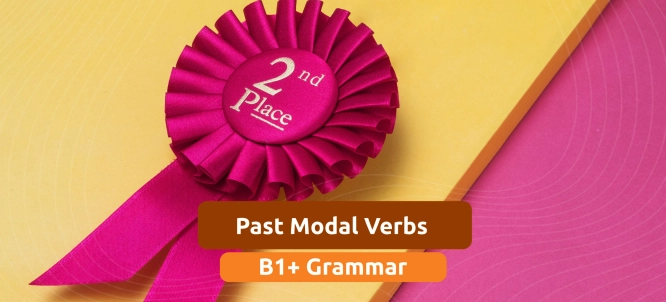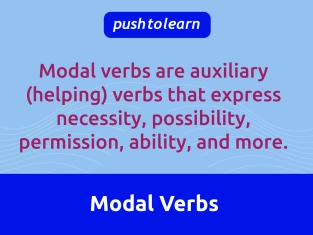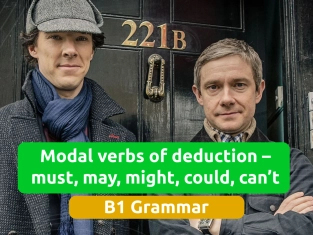by PushtoLearn
Past Modal Verbs
Table of Contents
Past Modal Verbs - Perfect Modals Exercises
These exercises focus on modals in the past
What Are Past Modal Verbs?
Past modal verbs are used to talk about possibilities, obligations, abilities, or regrets in the past. They follow this structure:
Structure
|
Part |
Example |
|
Modal Verb |
could, should, might, must, etc. |
|
Have |
have (always after the modal) |
|
Past Participle |
done, gone, been, etc. |

Types of Past Modal Verbs
1. Could Have: Expressing Possibilities or Missed Opportunities
Used to talk about something that was possible but didn’t happen.
Examples:
-
She could have won the race, but she fell.
-
I could have helped you if you had asked.
2. Should Have: Expressing Regret or Advice
Used to talk about what was the right thing to do but didn’t happen.
Examples:
-
You should have studied for the test.
-
He should have apologized for being late.
3. Would Have: Hypothetical Situations in the Past
Used to describe what might have happened if the situation were different.
Examples:
-
If I had known, I would have called you.
-
They would have won if they had practiced more.
4. Must Have: Deductions About the Past
Used to make a logical guess about what happened in the past.
Examples:
-
He must have forgotten the meeting.
-
They must have been very tired after the trip.
5. Might/May Have: Expressing Uncertainty
Used to suggest that something was possibly true in the past.
Examples:
-
She might have missed the train.
-
They may have forgotten to lock the door.
6. Can’t Have/Couldn’t Have: Expressing Impossibility
Used to describe something that was impossible in the past.
Examples:
-
He can’t have eaten all the cookies; there were too many!
-
They couldn’t have finished so quickly.
Everyday Use of Past Modals
Regret or Criticism
-
You should have called me before coming.
-
They shouldn’t have left so early.
Hypothetical Situations
-
If it had rained, we would have stayed indoors.
Guessing the Past
-
He must have been tired after the marathon.
-
They might have gone to the park.
Explaining Missed Chances
-
I could have joined the team if I had practiced harder.
-
She might have accepted if you had asked politely.
Common Errors
1. Forgetting "Have"
Incorrect: You should studied harder.
Correct: You should have studied harder.
2. Using the Wrong Past Participle
Incorrect: He might have ate the cake.
Correct: He might have eaten the cake.
3. Confusing Modals
Incorrect: He would have come if he knows.
Correct: He would have come if he had known.
FAQ
Why is "have" always used after modals in the past?
The word "have" links the modal verb to the past participle, showing the action happened in the past.
Can we use past modal verbs without a past participle?
No, the past participle is necessary to indicate the completed action in the past. Example: I could have gone (not I could have go).
What’s the difference between "might have" and "must have"?
-
Might have: Uncertainty about the past. (She might have left already.)
-
Must have: A logical deduction. (She must have left because her coat is gone.)
Can "could have" mean both ability and missed opportunity?
Yes.
-
Ability: He could have done better.
-
Missed opportunity: I could have joined the trip, but I didn’t.
What’s the difference between "should have" and "would have"?
-
Should have: Expresses advice or regret. (You should have been more careful.)
-
Would have: Expresses hypothetical outcomes. (I would have helped if I had known.)

